Recipients of the Sol Stetin Award for Labor History
2019: Joshua B. Freeman
Queens College and the Graduate Center, City University of New York
 Joshua B. Freeman is Distinguished Professor of History at Queens College and the Graduate Center of the City University of New York (CUNY) and affiliated with the CUNY School of Labor and Urban Studies. He received a A.B. from Harvard University and M.A. and Ph.D. degrees from Rutgers University. Prior to coming to CUNY, he taught at Columbia University and the College at Old Westbury, State University of New York.
Joshua B. Freeman is Distinguished Professor of History at Queens College and the Graduate Center of the City University of New York (CUNY) and affiliated with the CUNY School of Labor and Urban Studies. He received a A.B. from Harvard University and M.A. and Ph.D. degrees from Rutgers University. Prior to coming to CUNY, he taught at Columbia University and the College at Old Westbury, State University of New York.
Professor Freeman has written extensively about the history of labor, industry, modern America, and New York City. Most recently, he edited a collection of essays, City of Workers, City of Struggle; How Labor Movements Changed New York, published by Columbia University Press in conjunction with an exhibition on the history of labor movements in New York at the Museum of the City of New York. Behemoth: A History of The Factory and the Making of the Modern World, was published by W.W. Norton in February 2018 to widespread acclaim. A Brazilian edition of Behemoth was published in March 2019; Chinese, Korean, and Vietnamese editions are forthcoming.
Previous books by Professor Freeman include American Empire, 1945-2000: The Rise of a Global Power; the Democratic Revolution at Home, a volume in the Penguin History of the United States; Working-Class New York: Life and Labor since World War II; In Transit: The Transport Workers Union in New York City, 1933‑1966; Audacious Democracy: Labor, Intellectuals, and the Social Renewal of America (with Steve Fraser); and Who Built America? Working People and the Nation’s Economy, Politics, Culture, and Society (co-author). He has written for The New York Times, The Washington Post, The Daily News, Newsday, and The Nation and many academic journals, including Journal of Social History, Business History Review, Labor History, International Labor and Working-Class History, Labour/Le Travail, and Journal of American Ethnic History. He served as co-editor of International Labor and Working-Class History and was a long-time member if its editorial board. Freeman is currently on the editorial committee of Labor: Studies in Working-Class History. For four years he wrote a column for Transport Workers Union Local 100 Express about the history of the union. He has received the New York Society Library Book Prize for History, the Philip Taft Labor History Book Award, the John Commerford Labor Education Award, and fellowships from the American Council of Learned Societies, the National Endowment for the Humanities, and the CUNY Advanced Research Collaborative.
Freeman has appeared in a number of television documentaries, including Blackout” (American Experience, PBS, 2015); “Red Metal: The Copper Country Strike of 1913,” (PBS, 2013); “Nightmare in the City that Never Sleeps” (BBC Current Affairs, 2007); “Kong’s New York, 1933” (Special Edition DVD of “King Kong,” 2006); and Ric Burns’s “New York” (PBS, 2000-01). He served as an Organization of American Historians Distinguished Lecturer and has spoken widely, including to many labor groups. He has been an advisor for exhibits at the New-York Historical Society, the Museum of the City of New York, the Newark Museum, and the Brooklyn Historical Society. Professor Freeman lives in New York City.
2016: Alice Kessler-Harris
R. Gordon Hoxie Professor of History, Columbia University
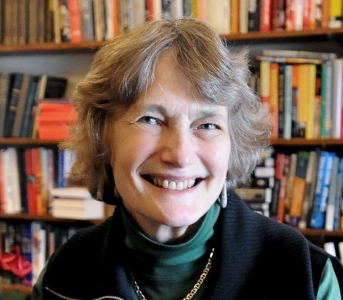 Born to Czech-Hungarian refugee parents, living in wartime Great Britain, Alice Kessler-Harris played a foundational role in shaping the field of women’s labor history. She began her career as an historian rescuing from obscurity the Jewish needle trades women who built the International Ladies Garment Workers Union, in the process discovering anew the pivotal role played by those passionate women radicals who battled both male privilege and sweatshop exploitation. From century-old penny papers, Kessler-Harris recovered the voices of these anonymous young women. “Jewish women courted the unions,” wrote Kessler-Harris, “that should have been courting them.”
Born to Czech-Hungarian refugee parents, living in wartime Great Britain, Alice Kessler-Harris played a foundational role in shaping the field of women’s labor history. She began her career as an historian rescuing from obscurity the Jewish needle trades women who built the International Ladies Garment Workers Union, in the process discovering anew the pivotal role played by those passionate women radicals who battled both male privilege and sweatshop exploitation. From century-old penny papers, Kessler-Harris recovered the voices of these anonymous young women. “Jewish women courted the unions,” wrote Kessler-Harris, “that should have been courting them.”
Starting in the 1970s she published a series of path-breaking articles that became classics and an inspiration to a generation of feminist historians of the working class in the U.S. and abroad. This work culminated in her 1982 book, Out to Work: A History of Wage-Earning Women in the United States, a canonical work in this field. In 2001, she published In Pursuit of Equity: Women, Men, and the Quest for Economic Citizenship in Twentieth Century America, which won the Bancroft Prize, and, in 2012, the acclaimed biography: A Difficult Woman: The Challenging Life and Times of Lillian Hellman. A committed trade unionist who, with her partner, Bertram Silverman, helped to create a collaborative degree-granting program for trade union members, she co-directed the program and taught union members for nearly a decade. Kessler-Harris is also a public intellectual who has fought sex discrimination in courtroom testimony and editorial page opinion pieces. For the past 30 years she has been an editor of The Working Class in American History series (sponsored by the University of Illinois Press) the longest-lasting series of scholarly monographs and serious histories of working people. The series (founded by David Brody, Herbert Gutman, and David Montgomery) has shaped the field of labor history and continues to open doors to young and experienced scholars who have linked the lives and experiences of ordinary workers with trade union organization and the history of capitalism. Kessler-Harris has served as the president of the Labor and Working-Class History Association, the American Studies Association, and the Organization of American Historians. Today she is the R. Gordon Hoxie Professor of History at Columbia University.
2014: Leon Fink
Distinguished Professor of History, University of Illinois at Chicago
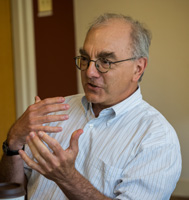 Leon Fink is Distinguished Professor of History at the University of Illinois and editor of the quarterly, Labor: Studies in Working-Class History of the Americas. A graduate of North Central High School in Indianapolis (where he served as student council president a year before future governor Mitch Daniels), the University of Warwick where he spent an independent year of study under E.P. Thompson, and Harvard College ‘70, Fink’s professional training as a historian began at the University of Rochester, where he received his doctorate under Herbert Gutman’s tutelage in 1977. Though he first taught as a Lecturer in the City College of New York, 1972-1974, his scholarly career largely developed at the University of North Carolina at Chapel Hill, 1977-2000 and, since 2000, in Chicago. A specialist in labor and immigration history, he has written, co-authored, or co-edited ten books, including, most recently: Workers in Hard Times: A Long View of Economic Crises (2014); Sweatshops at Sea: Merchant Seamen in the World’s First Globalized Industry, from 1812 to the Present (Chapel Hill: UNC Press, 2011), Workers Across the Americas: The Transnational Turn in Labor History (2011); The Maya of Morganton: Work and Community in the Nuevo New South (2003) and winner of the Thomas Wolfe Literary Award of the Western North Carolina Historical Association), and Progressive Intellectuals and the Dilemmas of Democratic Commitment (1998). Along the way, Fink has enjoyed numerous academic honors including service as a Lloyd Lewis Fellow at the Newberry Library, Guggenheim Fellow, NEH Research Fellow, Charles Warren Center Fellow at Harvard University, National Humanities Center Fellow, and a Senior Fulbright Lecturer at the University of Munich. At UIC, Fink founded the PhD concentration in the History of Work, Race, and Gender in the Urban World. Fink’s current book project, The Long Gilded Age: American Capitalism and the Lessons of a New World Order, 1880-1920 is due out from the University of Pennsylvania Press by the end of 2014.
Leon Fink is Distinguished Professor of History at the University of Illinois and editor of the quarterly, Labor: Studies in Working-Class History of the Americas. A graduate of North Central High School in Indianapolis (where he served as student council president a year before future governor Mitch Daniels), the University of Warwick where he spent an independent year of study under E.P. Thompson, and Harvard College ‘70, Fink’s professional training as a historian began at the University of Rochester, where he received his doctorate under Herbert Gutman’s tutelage in 1977. Though he first taught as a Lecturer in the City College of New York, 1972-1974, his scholarly career largely developed at the University of North Carolina at Chapel Hill, 1977-2000 and, since 2000, in Chicago. A specialist in labor and immigration history, he has written, co-authored, or co-edited ten books, including, most recently: Workers in Hard Times: A Long View of Economic Crises (2014); Sweatshops at Sea: Merchant Seamen in the World’s First Globalized Industry, from 1812 to the Present (Chapel Hill: UNC Press, 2011), Workers Across the Americas: The Transnational Turn in Labor History (2011); The Maya of Morganton: Work and Community in the Nuevo New South (2003) and winner of the Thomas Wolfe Literary Award of the Western North Carolina Historical Association), and Progressive Intellectuals and the Dilemmas of Democratic Commitment (1998). Along the way, Fink has enjoyed numerous academic honors including service as a Lloyd Lewis Fellow at the Newberry Library, Guggenheim Fellow, NEH Research Fellow, Charles Warren Center Fellow at Harvard University, National Humanities Center Fellow, and a Senior Fulbright Lecturer at the University of Munich. At UIC, Fink founded the PhD concentration in the History of Work, Race, and Gender in the Urban World. Fink’s current book project, The Long Gilded Age: American Capitalism and the Lessons of a New World Order, 1880-1920 is due out from the University of Pennsylvania Press by the end of 2014.
Other highlights of Fink’s career include a variety of public engagements. He has extensive involvement in public history and K-12 related history education, work that was recognized in his election as Vice President of the American Historical Association-Teaching Division, 1998-2001. Alongside colleagues and graduates in Chicago, he assumed leadership of the Chicago Labor Trail, a narrated map and accompanying website that received a best project award from the Illinois Humanities Council. Fink also takes regular delight in joining important debates on relevant public issues: his recent commentaries—on subjects ranging from an assessment of “Working America” on May Day to the attack on unionized workers in Wisconsin and Indiana—have appeared on Salon and Huffington Post and Pacifica Radio, as well as within the editorial pages of the Raleigh News and Observer and the Chicago Tribune. Moreover, as the official journal of the Labor and Working-Class History Association, Labor is determined—in print and through its website LaborOnline—to stretch across the academy, union offices, and beyond to reach an engaged, progressive public. Finally, Fink is a proud and active member of UIC-United Faculty, AFT-AAUP, a new faculty union currently struggling for its first contract.
2013: Marcus Rediker
Distinguished Professor of Atlantic History, University of Pittsburgh
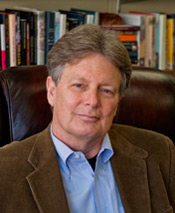 Marcus Rediker is Distinguished Professor of Atlantic History at the University of Pittsburgh. He specializes in the history of working people, free and unfree, from the seventeenth to the nineteenth centuries. He is the author of several books, which have been translated into a dozen languages, including (with Peter Linebaugh), The Many-Headed Hydra: Sailors, Slaves, Commoners, and the Hidden History of the Revolutionary Atlantic (Beacon Press, 2000), winner of the International Labor History Book Prize, and The Slave Ship: A Human History (Viking-Penguin, 2007), winner of the George Washington Book Prize. His most recent book, The Amistad Rebellion: An Atlantic Odyssey of Slavery and Freedom (Viking-Penguin, 2012), explores the famous event of 1839 through a new lens. He places at the center of the story not the American politicians and abolitionists who argued the case, but the fifty-three Africans who made the original, earth-shaking rebellion. Dr. Rediker has held fellowships from the Andrew W. Mellon Foundation, the American Council of Learned Societies, the National Endowment for the Humanities, and the John Simon Guggenheim Memorial Foundation.
Marcus Rediker is Distinguished Professor of Atlantic History at the University of Pittsburgh. He specializes in the history of working people, free and unfree, from the seventeenth to the nineteenth centuries. He is the author of several books, which have been translated into a dozen languages, including (with Peter Linebaugh), The Many-Headed Hydra: Sailors, Slaves, Commoners, and the Hidden History of the Revolutionary Atlantic (Beacon Press, 2000), winner of the International Labor History Book Prize, and The Slave Ship: A Human History (Viking-Penguin, 2007), winner of the George Washington Book Prize. His most recent book, The Amistad Rebellion: An Atlantic Odyssey of Slavery and Freedom (Viking-Penguin, 2012), explores the famous event of 1839 through a new lens. He places at the center of the story not the American politicians and abolitionists who argued the case, but the fifty-three Africans who made the original, earth-shaking rebellion. Dr. Rediker has held fellowships from the Andrew W. Mellon Foundation, the American Council of Learned Societies, the National Endowment for the Humanities, and the John Simon Guggenheim Memorial Foundation.
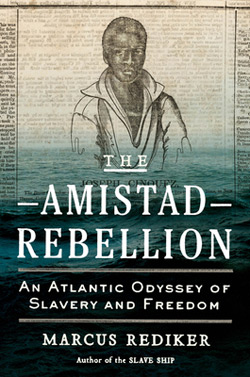 For a quarter-century, Marcus Rediker has chronicled the lives and struggles of working people in widely-acclaimed books that have expanded the very conception of the field of labor history. From a working-class family with roots in the mines and factories of the Upper South, Rediker stamped his scholarly mark elsewhere: on the sailors and captains and pirates and slaves who sailed the Atlantic in the 18th and 19th centuries. His first book, Between the Devil and the Deep Blue Sea: Merchant Seamen, Pirates, and the Anglo-American Maritime World, 1700-1750, published in 1987, was unlike anything labor historians had seen before, a journey away from the workshops, mines and factories of the 19th and 20th centuries, on which the field had focused, to the sea-faring laborers and rich cultures they created before the United States existed as a nation. The great labor historian E.P. Thompson wrote that “What distinguishes Rediker’s work is his unwavering and unsentimental focus on the seaman’s labour and experience in his cramped wooden world.” Rediker’s accomplishment was especially impressive given the scarcity of sources he had to work with in writing about long-ago workers, spurned in their own time, who left few records behind.
For a quarter-century, Marcus Rediker has chronicled the lives and struggles of working people in widely-acclaimed books that have expanded the very conception of the field of labor history. From a working-class family with roots in the mines and factories of the Upper South, Rediker stamped his scholarly mark elsewhere: on the sailors and captains and pirates and slaves who sailed the Atlantic in the 18th and 19th centuries. His first book, Between the Devil and the Deep Blue Sea: Merchant Seamen, Pirates, and the Anglo-American Maritime World, 1700-1750, published in 1987, was unlike anything labor historians had seen before, a journey away from the workshops, mines and factories of the 19th and 20th centuries, on which the field had focused, to the sea-faring laborers and rich cultures they created before the United States existed as a nation. The great labor historian E.P. Thompson wrote that “What distinguishes Rediker’s work is his unwavering and unsentimental focus on the seaman’s labour and experience in his cramped wooden world.” Rediker’s accomplishment was especially impressive given the scarcity of sources he had to work with in writing about long-ago workers, spurned in their own time, who left few records behind.
Among the laborers and rebels of the Atlantic world, Rediker discovered an egalitarian ethos that he has chronicled and celebrated. The Many-Headed Hydra: Sailors, Slaves, Commoners, and The Hidden History of the Revolutionary Atlantic, co-written with Peter Linebaugh, showed how these workers’ ideas and spirit informed the great revolutions of the late 18th century, including the American Revolution. In Villains of All Nations: Atlantic Pirates in the Golden Age, Rediker painted an eye-opening portrait of the pirate ship as an egalitarian workplace, in sharp contrast to the autocratic regime on the naval and merchant ships of the great sailing powers.
More recently, Rediker has turned to the story of the Atlantic slave trade. His wrenching, prize-winning book, The Slave Ship: A Human History, published in 2007, reconstructs in chilling detail the lives, deaths, and terrors of captains, sailors, and the enslaved aboard floating dungeons, trailed by sharks, on which captains and their officers treated sailors with brutality exceeded only by their abuse of the slave cargo. His most recent book, The Amistad Rebellion: An Atlantic Odyssey of Slavery and Freedom, tells the extraordinary story of a group of slaves who in 1839 seized the schooner on which they were being transported, killed the captain, and fought a prolonged legal battle that ended with their return to Africa as free men.
Marcus Rediker, as a scholar, teacher, and long-time political activist, has worked to expose inhumanity in the workplace and in society and to recover the history of those who fought it. His capacious notion of labor history has helped revolutionize the field and launch the transnational study of the Atlantic World. Through his work, we know far more than ever before about the once nearly-forgotten men and women whose labor on open seas and shore side made possible the world in which we live today.
2012: Nelson Lichtenstein
MacArthur Foundation Chair in History & Director of the Center for the Study of Work, Labor and Democracy, University of California, Santa Barbara
 Nelson Lichtenstein is MacArthur Foundation Chair in History at the University of California, Santa Barbara and director there of the Center for the Study of Work, Labor, and Democracy. He is the author or editor of more than a dozen books, includingLabor’s War at Home: The CIO in World War II (1983); Walter Reuther: the Most Dangerous Man in Detroit (1996); State of the Union: A Century of American Labor (2002); and The Retail Revolution: How Wal-Mart Created a Brave New World of Business (2010). Most recently, he is the editor, with Elizabeth Shermer, of The Right and American Labor: Politics, Ideology, and Imagination. Lichtenstein, who earlier taught at the Catholic University of America and at the University of Virginia, has held fellowships from the National Endowment for the Humanities, the Rockefeller and Guggenheim Foundations, the Fulbright Commission, and the University of California. His reviews and opinion pieces have appeared in The Los Angeles Times, The New York Times, Dissent, New Labor Forum, American Prospect, and academic journals.
Nelson Lichtenstein is MacArthur Foundation Chair in History at the University of California, Santa Barbara and director there of the Center for the Study of Work, Labor, and Democracy. He is the author or editor of more than a dozen books, includingLabor’s War at Home: The CIO in World War II (1983); Walter Reuther: the Most Dangerous Man in Detroit (1996); State of the Union: A Century of American Labor (2002); and The Retail Revolution: How Wal-Mart Created a Brave New World of Business (2010). Most recently, he is the editor, with Elizabeth Shermer, of The Right and American Labor: Politics, Ideology, and Imagination. Lichtenstein, who earlier taught at the Catholic University of America and at the University of Virginia, has held fellowships from the National Endowment for the Humanities, the Rockefeller and Guggenheim Foundations, the Fulbright Commission, and the University of California. His reviews and opinion pieces have appeared in The Los Angeles Times, The New York Times, Dissent, New Labor Forum, American Prospect, and academic journals.
2011: Melvyn Dubofsky
Distinguished Professor of History and Sociology Emeritus, Binghamton University, SUNY
 Born and raised in Brooklyn, New York, Melvyn Dubofsky is a product of the city public school system and the city university. For the past fifty years, he has taught at public universities in Illinois, Massachusetts, Wisconsin, and since 1971, at the State University of New York at Binghamton (now Binghamton University), where prior to his retirement in 2006, he served as Distinguished Professor of History & Sociology.
Born and raised in Brooklyn, New York, Melvyn Dubofsky is a product of the city public school system and the city university. For the past fifty years, he has taught at public universities in Illinois, Massachusetts, Wisconsin, and since 1971, at the State University of New York at Binghamton (now Binghamton University), where prior to his retirement in 2006, he served as Distinguished Professor of History & Sociology.
Dubofsky has taught and participated in collaborative projects with other scholars in England (succeeding David Montgomery as the Visiting Senior Lecturer in American Labor History at the Centre for the Study of Social History at the University of Warwick), Israel, Austria (where he served as a Distinguished Fulbright Professor), the Netherlands (where he was the John Adams Professor of American Civilization at the University of Amsterdam), France, and the former Soviet Union.
He has written and edited numerous books about labor and working-class history in the US, among which the most notable are his first,When Workers Organize: New York City in the Progressive Era (1967),We Shall Be All: A History of the Industrial Workers of the World(1969), John L. Lewis: A Biography (1977, co-written with Warren Van Tine); The State and Labor in Modern America (1994); and Hard Work: The Making of a Labor Historian (2001). He has also written numerous reviews and essay for various scholarly journals, general interest periodicals, and on-line sites. Currently, he is editing a two-volume history of American Economic, Business, and Labor History for Oxford University Press.
2010: Dorothy Sue Cobble
Professor of Labor Studies, History, and Women’s and Gender Studies,Rutgers, The State University of New Jersey
 Dorothy Sue Cobble received her Ph.D. in American History from Stanford University in 1986. She studies the changing nature of work, social movements, and social policy in the U.S. and globally. Her books include the award-winning Dishing It Out: Waitresses and Their Unions in the Twentieth Century (Illinois, 1991); Women and Unions: Forging a Partnership (Cornell, 1993); The Other Women’s Movement: Workplace Justice and Social Rights in Modern America (Princeton, 2004) which won the 2005 Philip Taft Book Prize for the best book in American labor history in 2004 among other awards; and The Sex of Class: Women Transforming American Labor (Cornell, 2007).
Dorothy Sue Cobble received her Ph.D. in American History from Stanford University in 1986. She studies the changing nature of work, social movements, and social policy in the U.S. and globally. Her books include the award-winning Dishing It Out: Waitresses and Their Unions in the Twentieth Century (Illinois, 1991); Women and Unions: Forging a Partnership (Cornell, 1993); The Other Women’s Movement: Workplace Justice and Social Rights in Modern America (Princeton, 2004) which won the 2005 Philip Taft Book Prize for the best book in American labor history in 2004 among other awards; and The Sex of Class: Women Transforming American Labor (Cornell, 2007).
Her essays have appeared in numerous anthologies, journals, and other publications including a recent featured article, “It’s time for New Deal feminism,” in the Washington Post (13 December 2009). Her research has been funded by the Charles Warren Center for the Study of American History at Harvard University, the Woodrow Wilson Center for International Scholars, the National Endowment for the Humanities, the American Council of Learned Societies, the U. S. Department of Labor, and other sources. Next year, as a Visiting Scholar at the Russell Sage Foundation, she will be finishing a historical study of US labor’s traditions of egalitarian liberalism and internationalism in the twentieth century. She is also working on a biography of labor feminist and consumer activist Esther Peterson. She is a senior editor of the International Labor and Working-Class History journal.
2009: James Green
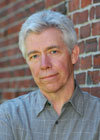 Jim Green (1944 - 2016) was a professor of history and labor studies at the University of Massachusetts, Boston. He devoted his professional life to writing the history of working people for working people. The clear, persuasive analysis and careful research that have characterized his books, articles, classes, films, and other public presentations made him an outstanding teacher in classrooms, union halls, and historical organizations in America and abroad.
Jim Green (1944 - 2016) was a professor of history and labor studies at the University of Massachusetts, Boston. He devoted his professional life to writing the history of working people for working people. The clear, persuasive analysis and careful research that have characterized his books, articles, classes, films, and other public presentations made him an outstanding teacher in classrooms, union halls, and historical organizations in America and abroad.
2008: David Brody
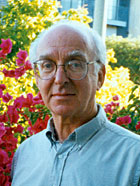 David Brody rose to prominence following the 1969 publication of his pioneering history of early steelworker unions, The Steelworkers in America: The Nonunion Era, a book based on his doctoral dissertation. Brody is one of a few historians credited with founding the field of “new labor history” in North America, a branch of labor history that examines working-class culture and the experiences of workers, women and minorities in the study of history, rather than focusing solely on the history of workers’ organizations. He has written numerous articles and book-length treatments of the ethical, organizational and social construction of work and employment. In recent years, Brody has focused on the origins and transformation of American labor law, labor law reform and weaknesses in the structure and interpretation of the National Labor Relations Act. He is Professor Emeritus of History at the University of California at Davis.
David Brody rose to prominence following the 1969 publication of his pioneering history of early steelworker unions, The Steelworkers in America: The Nonunion Era, a book based on his doctoral dissertation. Brody is one of a few historians credited with founding the field of “new labor history” in North America, a branch of labor history that examines working-class culture and the experiences of workers, women and minorities in the study of history, rather than focusing solely on the history of workers’ organizations. He has written numerous articles and book-length treatments of the ethical, organizational and social construction of work and employment. In recent years, Brody has focused on the origins and transformation of American labor law, labor law reform and weaknesses in the structure and interpretation of the National Labor Relations Act. He is Professor Emeritus of History at the University of California at Davis.
2007: David Montgomery
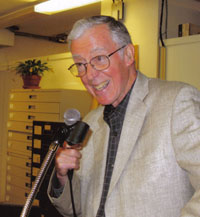 David Montgomery (1927 – 2011) was a Farnam Professor of History Emeritus at Yale University. He was an active member of the IAM, the UE and the Teamsters during the 10 years he worked as a machinist in New York and the Twin Cities. In 1962, he earned a PhD in History at the University of Minnesota, spent 14 years teaching at the University of Pittsburgh and two years in England helping British social historian, E.P Thompson, establish the Centre for the Study of Social History at the University of Warwick. He authored many articles and books about the history and prospects of working people in the United States. He was President of the Organization of American Historians from 1999 to 2000.
David Montgomery (1927 – 2011) was a Farnam Professor of History Emeritus at Yale University. He was an active member of the IAM, the UE and the Teamsters during the 10 years he worked as a machinist in New York and the Twin Cities. In 1962, he earned a PhD in History at the University of Minnesota, spent 14 years teaching at the University of Pittsburgh and two years in England helping British social historian, E.P Thompson, establish the Centre for the Study of Social History at the University of Warwick. He authored many articles and books about the history and prospects of working people in the United States. He was President of the Organization of American Historians from 1999 to 2000.

